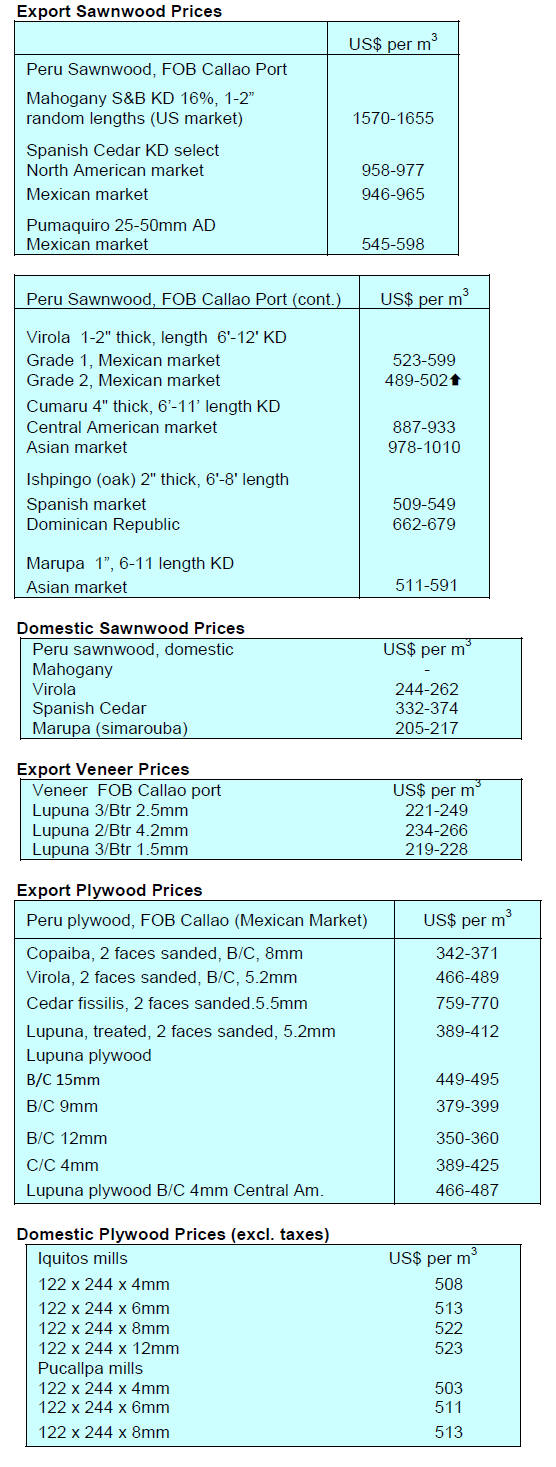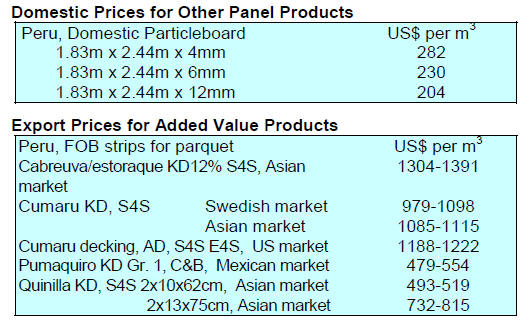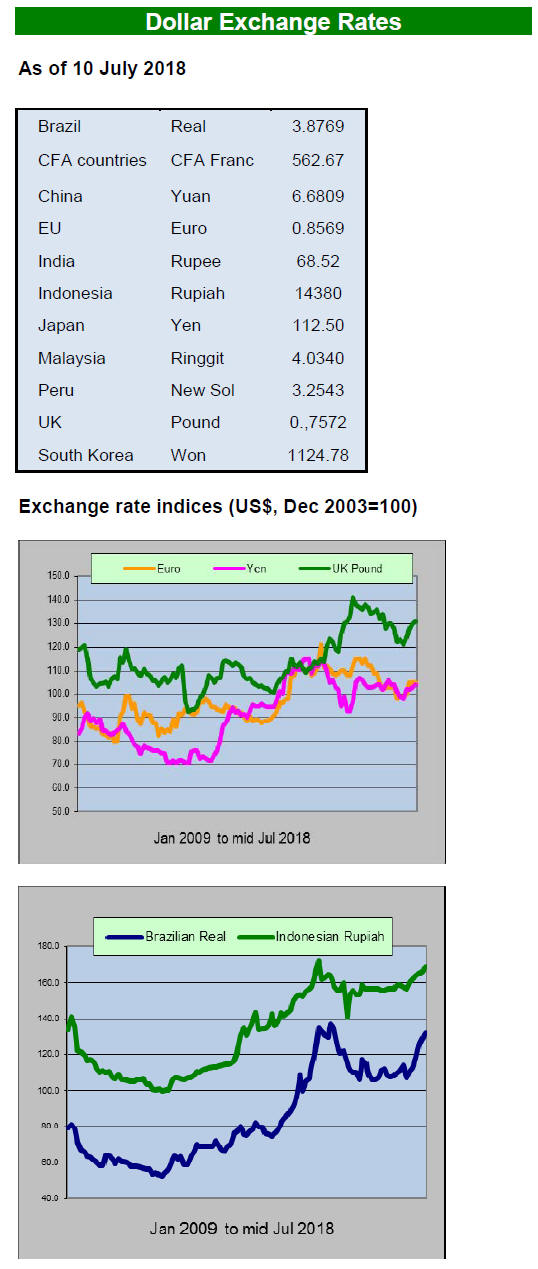2. GHANA
Millers briefed on exporting to UK
At a UK/Ghana Export Forum organised by the UK/Ghana
Chamber of Commerce, exporters expressed interest in
expanding trade with the UK but lamented the frequent
changes in export regulations in Ghana. Exporters said that
frequent changes in export regulations and the high cost of
borrowing to expand production are holding back business
expansion.
Ghana introduces cargo tracking system for imports
A press release from the Ghana Revenue Authority (GRA)
explains the new Cargo Tracking Note (CTN) System that
took effect 1 July 2018.
The press release says: “for all shipments to Ghana (transit
cargo included) shippers/Exporters/Forwarders at the
various Ports of Loading around the World are required to
obtain a validated CTN number using the global online
platform provided and submit same together with Shipping
Instructions (SI) to their Shipping Lines. Each Bill of
Lading must be covered by a valid CTN number.
Shipping Lines are required to insert the unique CTN
number on both the Bill of Lading and Cargo Manifest.
Shipments not covered by a valid CTN number will not be
cleared through Customs in Ghana and fines may apply.
The introduction of CTN is in furtherance of GRA’s drive
to modernise its operations for facilitation of legitimate
trade in line with international best practices”.
See: http://www.gra.gov.gh/index.php/category/item/818-cargotracking-
note-system2
Forest reclamation activities suspended
When meeting the media recently the Forestry
Commission CEO, Owusu Afriyie, announced the
Commission had suspended all contracts related to forest
reclamation in forest reserves across the country. Letters
cancelling all contracts were sent to contractors after it
was discovered that some companies had breached the
contract agreement.
Afriyie said the suspension is to allow the review and
stock-taking of operations and activities of private
contractors who have been engaged on the reclamation
project.
Ghana losing forest at 2% per year
Ms. Mafalda Duarte, Head of the Climate Investment
Fund of the World Bank, has warned the country it faces
losing its entire forest cover in 20 years if the current rate
of deforestation continues. She advised the government to
identify the key challenges and initiate an action plan to
check the rate of deforestation.
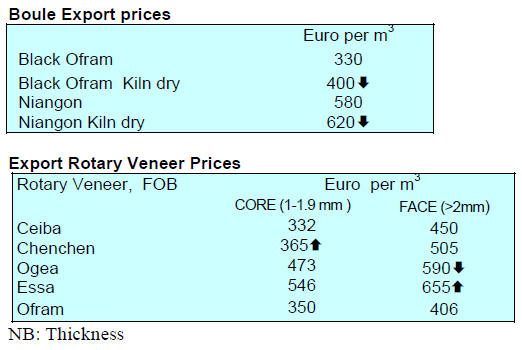
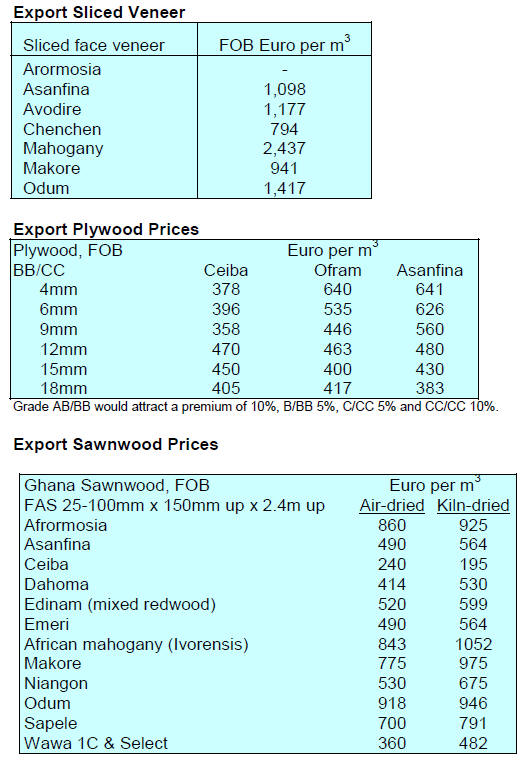
3.
MALAYSIA
New Minister of Primary Industries
The final round of ministerial positions has been
completed in Malaysia following the recent general
election. The Ministry of Plantation Industries and
Commodities has been renamed the Ministry of Primary
Industries as it was many years ago.
The new Minister of Primary Industries is Teresa Kok, she
has a degrees in communications and political science and
a master’s degree in philosophy.
In her first public statement she said her ministry will
focus on increasing the number of high value-added
products from plantation and will support research and
development to raise the commercial value of production
and improve product quality and environmental
sustainability. The Deputy Minister is Shamsul Iskandar
Mohd Akin.
See://www.channelnewsasia.com/news/asia/malaysia-swears-in-
13-ministers-and-23-deputy-ministers-10490684
Oil palm stems as a raw material for industry
In Malaysia there is growing interest in investigationg
substitutes to supplement timber supplies from natural and
planted forests.
The Malaysian Timber Council (MTC) has been playing a
key role in highlighting the potential of Oil Palm Trunks
(OPTs). Recently MTC conducted public discussions on
the use of OPTs.
OPTs that come from palms felled during replanting could
be an alternative source of raw material for the woodbased
industry. Malaysia was one of the first to use OPTs
to produce ‘palm wood’ and bio-composite products.
The commercial life of oil palms is considered to be 25
years meaning oil palm estates will fell and replant every
25 years. Malaysia has around 5.7 million hectares of oil
palm and an estimated 80,000 to 100,000 ha. is felled
annually yielding about 18 million palm stems.
Palm stems are not easy to mill or utilise as the density
varies at different parts of the stem being lower in the core
and at the top of the stem compared to the base and outter
part of the stem in the same way as in coconut palm stems.
Also, palm boards are very susceptible to fungal and insect
attacks due to the high sugar and starch content. Research
suggests that OPTs may be suitable for the manufacture of
composite panel products.
In related news the Sarawak Timber Industry
Development Corporation (STIDC) has embarked on
programmes focusing on non-timber based materials for
the timber industry such as bamboo. Deputy Chief
Minister, Awang Tengah Ali Hasan, said the state
government is committed to greater sustainable
management of forest in view of the reduction in harvests
from the state’s natural forest.
The domestic press in Sarawak has reported that Subur
Tiasa Holdings will partner STIDC in developing of
bamboo plantations and utilisation studies.
Sabah moves to restructure forestry sector
The new state government in Sabah, installed after general
elections in early May, has clarified its position on the
timber industry, especially the interim ban on log exports.
Sabah Chief Minister, Mohd Shafie Apdal, has said that
among the various factors behind the decision to ban log
exports was the need to break what has been termed ‘a
Sabah timber cartel’ that allegedly monopolised the sector.
Shafie explained that the ban was part of a comprehensive
restructuring of the state’s forestry sector.
See more at https://www.thestar.com.my/metro/metronews/
2018/07/06/log-export-ban-aims-to-break-sabah-timbercartel-
shafie-we-need-to-change-so-that-more-people-canbe/#
bhFh5M5gpjgZysmW.99
Certified forest management unit in Sarawak
In response to a state directive that logging companies
must be certified, Ta Ann, one of the big six of timber
companies in Sarawak, has announced that its Kapit Forest
Management Unit (FMU) has been awarded the Certificate
for Forest Management (Natural Forest) under the
Malaysian Timber Certification Scheme (MTCS), a
scheme endorsed by the PEFC.
The certificate was awarded by SIRIM QAS International
in June with a validity of three years after a two stage
audit, a series of stakeholder consultations and a peer
review.
Covering an area of 149,756 hectares, the Kapit FMU is
located in the southern part of Kapit District and is the first
FMU under Ta Ann Group to be certified. The FMU
constitutes 44 % of licensed concession area under Ta Ann
Group which has a combined licensed area size of 337,996
hectares.
The certification of its Kapit FMU is an important step
forward which will enable theta An Group to further
increase its production of certified plywood products.
June plywood prices
Meanwhile, plywood traders based in Sarawak reported
the following export prices:
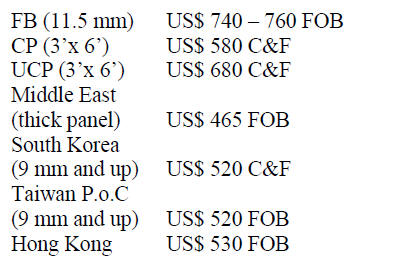
4.
INDONESIA
Government to review export
duties
To boost exports the government plans to develop a
number of incentives and review export duties for several
sectors including the timber sector. The aim is to make
domestic production more competitive to support growth
in exports to help reduce the trade deficit.
In other moves, the Industry Minister, Airlangga Hartarto,
will act on import duties to protect domestic
manufacturers as he fears there could be a surge in imports
of wood products from China because of the rise in US
import duties.
The local media is reporting that the government is also
preparing new incentives for small and medium
enterprises especially in the furniture sector in order to
increase the export competitiveness. One action will be to
provide subsidies for Timber Legality Verification System
certification.
Strong dollar improves export prospects
Prospects for Indonesia's wood product manufacturers are
improving on the back of stronger world demand and the
strength of the US dollar.
Indroyono Soesilo, Chairman of the Association of
Indonesian Forest Concessionaires (APHI), said the
stronger dollar works in Indonesia’s favour as exports are
that much cheaper. As of May 2018 the value of
Indonesia’s wood product exports was US$5.71 billion.
Indonesia and Austria strengthen trade in wood
products
Indonesia trades FLEGT licensed wood products
throughout the EU including to Austria. As of September
2017, the Austrian authorities reported that around 200
FLEGT licensed timber shipments had been received from
Indonesia.
In order to strengthen the implementation of FLEGT
license system the Ministry of Forestry, together with the
Ministry of Foreign Affairs, hosted a workshop on
‘Strengthening Implementation of FLEGT License
between Indonesia and Austria’.
Over the past five years Indonesia’s export of wood
products to Austria has been dominated by furniture,
handicrafts and woodbased panels and the trade has grown
from US$444,000 in 2013 to US$2.5 million in 2017.
US the main export market for furniture
Abdul Sobur, Secretary General of Association of
Indonesian Furniture and Handicraft Industry, said exports
recorded good growth in the first half of this year and the
main market for Indonesian furniture and handicraft was
the US.
The total value of furniture and handicraft exports in the
first half of 2018 reached US$1.3 billion, a year on year
increase of 9% compared with the same period last year.
This was achieved as Indonesian exporters had diversified
into over 100 different markets largely due to the success
of the IFEX exhibition in March.
In related news, Sobur pointed out that, while the
government has targeted furniture exports for 2019 at
US$5 billion, comprising US$3.2 billion for furniture and
US$1.8 billion for handicraft, this will be difficult to
achieve because of the obstacles faced by manufacturers.
Among the most problematic obstacles are high bank
interest rates, inadequate raw material supply, SVLK
compliance and the complexity of importing raw
materials. Sobur called on the government to address
burdensome regulations so the sector could grow.
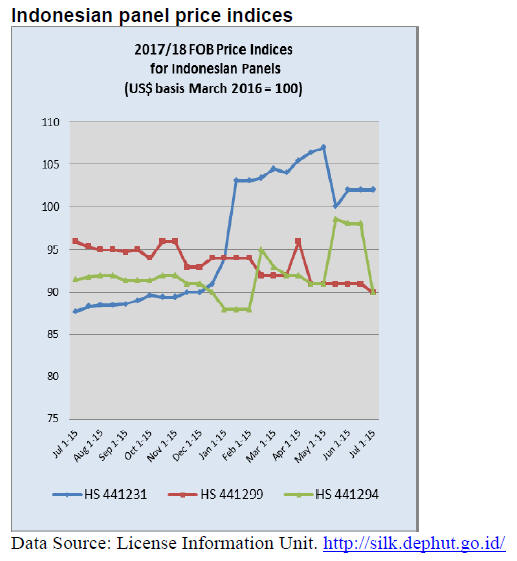
5.
MYANMAR
Proposal for plantation log export
Zaw Min, Deputy Director General of the Forestry
Department, has been quoted by the domestic press as
saying the Forest Department has proposed allowing the
export of logs from private plantation forests. Myanmar
introduced a ban on natural forest log exports in April
2014.
Private forest plantations have been permitted since 2006
and extend over about 80,000 ha. around half of which is
teak and the balance other hardwoods. Currently, thinnings
from plantations are utilised locally but these are of small
diameter and domestic mills are better equipped to mill
large natural forest logs.
Independent third party certification bodies ready to
start work
Analysts in contact with Myanmar exporters say the
consensus amongst timber exporters is that it is
increasingly obvious that the trade in teak products to EU
is set to decline sharply. One exporter said that until the
country has a verifiable chain of custody system which
allows EU importers to satisfy the due diligence
requirements of the EUTR trade will be hampered.
The exporter complained that, currently, even if exporters
secure an export permit from Forest Department, which
requires meeting their strict regulations, exports can be
rejected in the EU as the authorities cite weak compliance
with regulations.
Recently, a FLEGT advisor to the Forestry Department
and the Ministry of Natural Resources and Environmental
Conservation (MONREC) compiled a dossier on the
supply chain from the forest to the point of export.
But currently there is no system in place to independently
verify compliance along the supply chain.
In response to this, Barber Cho, Secretary of Myanmar
Forest Certification Committee (MFCC), has indicated
that independent Third Party Certification Bodies (CBs)
will be ready to start the certification process in July this
year.
He said the system and documentation are almost ready
and training for the auditors has been completed. A ‘soft’
launch will take place in July.
To begin there will be four certification bodies, three
domestic entities and one international. However, he said,
because such a system is new to Myanmar, it will take
time for the CBs to reach full capacity.
The performance of the CBs will be closely watched by
the MFCC. Cho said he welcomes constructive
cooperation and technical support from any organizations
so that the third party certification process can move
progressively to satisfy international requirement.
Cho also stressed that the priority of the MFCC is to
enhance cooperation in legality verification with the
FLEGT advisor to MONREC so as to build trust between
all parties and create an environment where trade with the
EU and other international markets can flourish.
A plea for more emphasis on investments
Statistics from Myanmar's Directorate of Investment and
Company Administration show that, investments from
China made up around one third of total investments in the
financial year 2014-15. In contrast, investments by US
companies accounted for less than 1%.
A Special Economic Consultant to Aung San Suu Kyi has
called on the international community put more emphasis
on helping Myanmar secure investments.. He
said the Western media continues to intensify their
criticism of the country. With abundant oil and gas
reserves as well as a large young population Myanmar
considerable potential to attract investment.
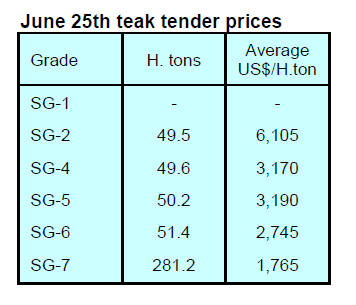
6. INDIA
Van Mahotsav
Uttar Pradesh Chief Minister, Yogi Adityanath, officially
launched the State’s participation in Van Mahotsav on 1
July and applauded the efforts of the residents of Uttar
Pradesh for being a part of this tree plantation initiative.
Van Mahotsav is a tree planting festival held annually in
India. 'Van' means 'forest' and 'mahotsav' means 'festival'.
This tree-planting movement began in 1950. It has gained
significant national importance and every year millions of
saplings are planted across India in observation of Van
Mahotsav week.
Adityanath began the State’s participation in the Van
Mahotsav festival by planting a sapling at Barabanki.
While addressing a gathering there he said protecting the
environment has always been his priority and he urged
people to join his cause of environmental protection
because Uttar Pradesh has a low forest cover at just 9%,
far below the national average of 33%.
Apart from the Forest Department, school and college
students as well as officials from other government
departments were asked to join the tree planting exercise.
Plantation teak imports
Demand for imported logs has slowed due to the onset of
monsoon which impacts building work, traders report
supplies have also slowed. The strong dollar, rising for last
three months, has been increasing the landed cost of
imports so traders have cut back on orders.
The Indian Rupee has been sliding due to high oil prices
and resultant heavy payments in foreign currencies.
Because of this situation domestic wholesale prices for
imported teak keep rising but the C&F prices remain flat.
The market for teak and other wood products has been
affected for months by home sales.
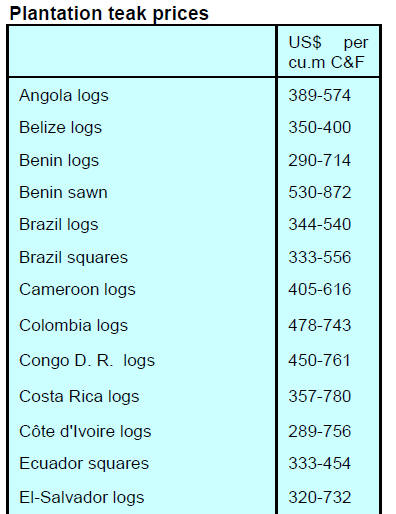
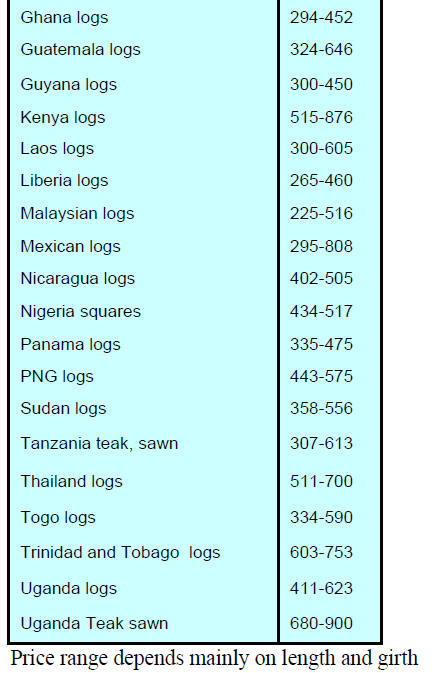
Locally sawn hardwood prices
As previously reported importers say they cannot offer
higher prices to exporters because of the stiff competition
amongst traders and competition from alternative timbers
from West Africa and South America. Analysts point out
that eventually importers will have to agree to higher FOB
prices or face losing market share to alternative timbers.
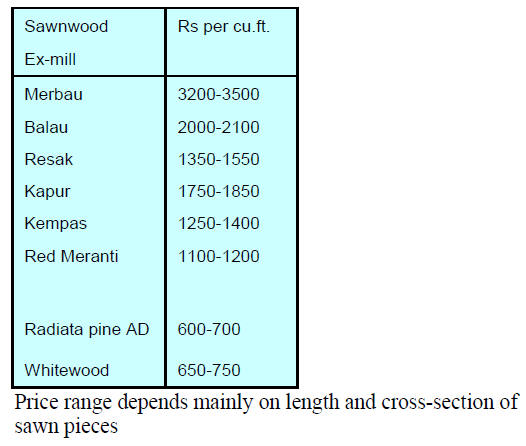
Imported sawn Myanmar teak
Importers in India still have stocks of Myanmar teak logs
imported before the export log ban introduced by
Myanmar. Analysts report that teak log sales are very slow
and that this is related to the availability of teak faced
plywood and teak veneers being imported from China in
large volumes.
In other news, okoume veneers continue to replace veneers
produced from imported gurjan and keruing logs.
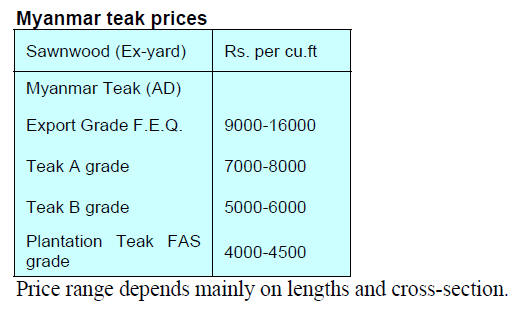
Prices for imported sawnwood
Prices for imported sawnwood (KD 12%) ex-warehouse
remain unchanged.
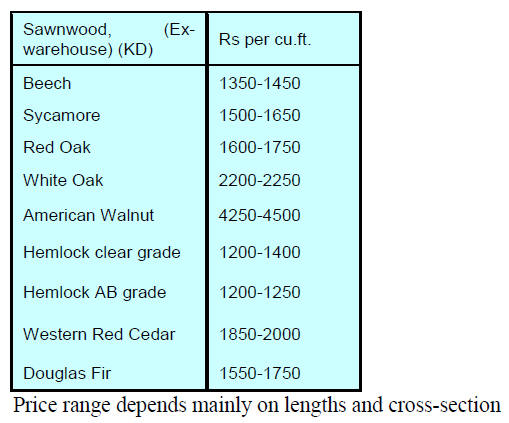
Domestic plywood update
Composite panels, especially MDF, have been gaining
market share from plywood. A new production facility
producing wood/cement board has become operational in
the south of India, adding to the competition.
Consumption of woodbased composite panels has been
growing at around 15% annually compared to the 7-8%
growth in consumption of plywood.
Plywood manufacturers are waiting for an opportunity to
raise prices to off-set rising raw material costs and the
weaker rupee. Analysts say a 5-10% price hike is likely
from around August. Current prices remain unchanged.
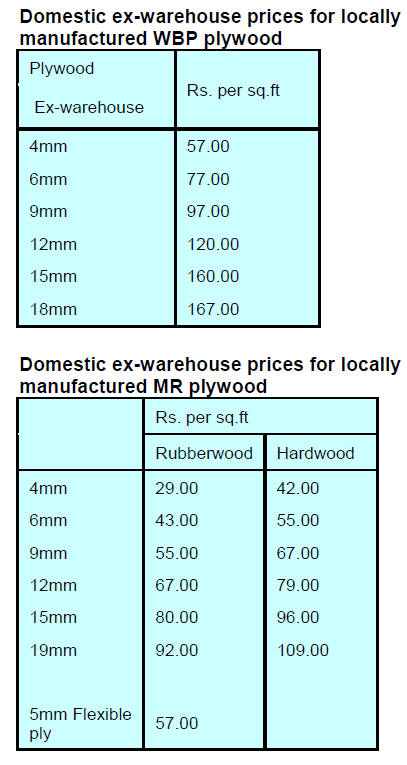
7. BRAZIL
Mato Grosso to double forest
management area by
2030
In the State of Mato Grosso there are some 3.2 million
hectares of sustainably managed forests and this is
expected to rise to 6 million hectares by 2030.
In all 44 municipalities in Mato Grosso the domestic
economy is driven by the forestry sector which ranks 4th
amongst all economic sectors. In 2017 the forestry sector
contributed more than R$47 million in taxes and over
R$16 million towards the State Fund for Transportation
and Housing (FETHAB).
Forest management in Mato Grosso is a very complex and
involves compliance with numerous regulations. In
addition, authorisations and supervision of forestry
activities, including harvesting, transportation and trade,
involves several government agencies including the
Institute of Environment and Natural Renewable
Resources (IBAMA), the Institute of Agricultural and
Livestock Defense (INDEA) and the Brazilian Federal
Highway Police making management overly bureaucratic.
The Center for Timber Producers and Exporters of Mato
Grosso State (CIPEM), together with the National Forum
of Forest-based Activities (FNBF) and SEMA-MT,
recently held a workshop dedicated to practical experience
in forest management aimed at opening a dialogue with
the regulatory agencies so they better understand the
forestry sector.
In holding the workshop CIPEM hoped to demonstrate its
commitment to legality and to educate government
agencies and society on what it means to conserve
Amazonian forests through sustainable forest
management.
IEMI presents furniture market data
According to an IEMI market research institute report
published this year furniture production in 2017 showed
signs of recovery after years of consecutive declines.
The report says that, while growth is subdued (0.3%) in
2017 over 2016, the turn-around is important for the
industry indicating market stabilisation and the beginning
of a new era for the domestic furniture market.
Another important observation was the resumption of
growth in furniture imports, which although representing
only 2.6% of the domestic furniture consumption, rose
46% last year.
Furniture exports have remained relatively stable over the
past five years accounting for around 3.5% of domestic
production. For 2018, preliminary estimates point to a
more significant growth in furniture production at over 4%
compared to 2017. The report concludes that there could
be significant export growth in 2018.
Brazilian wood industry promoting business in Europe
In a meeting with the Belgian Investment Agency
(AWEX), representatives of ABIMCI (Brazilian
Association of the Mechanically Processed Timber
Industry) focused on attracting investments by Belgian
companies.
ABIMCI representatives also held a meeting with the
World Customs Organization (WCO) to develop technical
cooperation among Customs administrations and to
promote simplification of international standards and their
harmonised application.
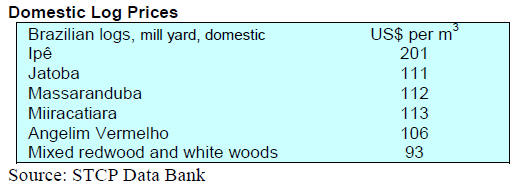
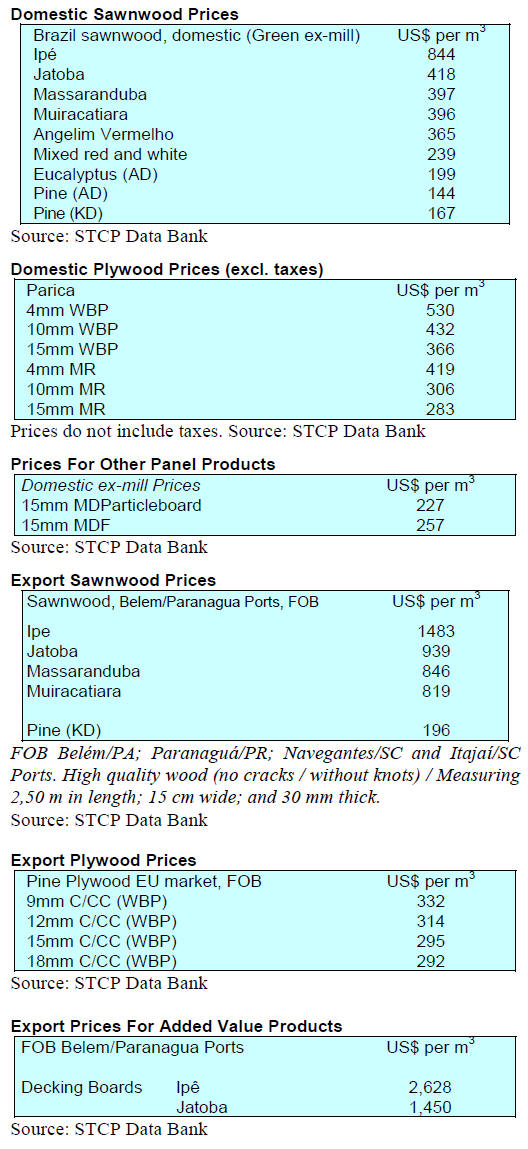
8. PERU
Exchange of experiences in
Germany: dialogue of
experts on forest management
Officials from the Ministry of Environment, the National
Forestry and Wildlife Service, the Forest and Wildlife
Resources Oversight Agency and the General Directorate
of Forestry and Wildlife of Ucayali recently visited
Germany to participate in a dialogue with public and
private sector forestry and timber trade specialists.
The aim of the visit was to experience systems for forest
governance and management in Germany so as to generate
innovative ideas that could be applied in Peru.
The Peruvian delegation had the opportunity to exchange
ideas with officials from different institutions of the
Bavarian state, such as the Federal Ministry of Food and
Agriculture and the State Forestry Company (Bayerische
Staatsforsten).
The discussions centred on issues such as public
administration and forest governance, management and
organisation for sustainable forest management, capacity
building and training, public participation and channels
for communication between the federal government and
state governments.
The visit was arranged by GIZ, through its ProAmbiente II
programme in coordination with the German Forestry
Association.
Regional authorities validate anti-corruption plan for
forestry
As part of efforts to strengthen an anti-corruption plan, a
regional workshop themed "National Anticorruption Plan
of the Wildlife Forest Sector 2018 - 2021" was conducted
with the aim of securing input on the plan from regional
forest and wildlife authorities in Loreto, Amazonas,
Ucayali, San Martín and Madre De Dios.
Contributions to improve the plan included, for example,
guaranteed transparency and access to public information,
simplifying administrative measures; installing a culture of
integrity and public ethics and strengthening disciplinary
measures.
This workshop will be replicated in Huánuco and will
involve participation of the Regional Forestry and Wildlife
Authorities of Huánuco and La Libertad and the Technical
Forestry and Wildlife Administrations of Arequipa, Cusco,
Cajamarca, Lambayeque, Moquegua - Tacna, Central
Sierra and Central Selva.
Technical forum on forest plantations
The Forest and Wildlife Service (SERFOR), the Forestry
Chapter of the Departmental Council of Lima of the
College of Engineers of Peru - CIP and the company,
Arborizaciones EIRL, recently organised an international
technical forum on forest plantations with participation of
professionals from Brazil, Argentina, Chile and Peru.
Three main components of the event included forestry
business, production (efficiency of management in terms
of costs and productivity), logistics (variables such as
distance to market, infrastructure and harvest) and markets
(type of demand, size and offer and demand).
Experts from Brazil, Argentina and Chile urged Peru not
to make the mistakes that they saw in their respective
countries. The Peruvian experts also commented on their
experiences and difficulties they are encountering in
promoting plantations.
